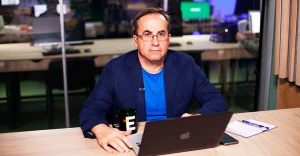
US destroying Russian army as response to Russian nuclear weapons use would be security guarantee for Ukraine – Diplomat Bryza
Diplomat Bryza outlined what a security guarantee for Ukraine could look like: the US destroying the Russian army if Russia uses nuclear weapons
This was stated by American diplomat Matthew Bryza on Espreso.
“From a logical standpoint, none of the promises mentioned in the Budapest Memorandum hold much value unless NATO and Ukraine's other allies genuinely show their willingness to provide Ukraine with the necessary military support to prevent a Russian victory. Currently, we are witnessing an unprecedented level of aid in the form of military weapons. However, the future will bring about significant changes. Ukraine will establish a strong network of connections in the realm of political security, with the most crucial aspect being its membership in NATO. This membership will clearly signify that an attack on Ukraine is tantamount to an attack on the entire Alliance,” he said.
The diplomat highlights that until these goals are accomplished, it is essential for NATO, the USA, Japan, and South Korea to go beyond simply observing the ongoing conflict. They should also consider providing military assistance on the ground, as some NATO members have mentioned.
“Reports suggest that when Putin made threats regarding the use of nuclear weapons, Bill Burns, the head of the CIA, traveled to Moscow and conveyed a message that if such actions were taken, the United States would intervene militarily and ultimately dismantle the Russian military, so to speak. In my opinion, these threats are credible. They serve as a security guarantee for Ukraine, assuring that if Putin deploys tactical nuclear weapons, the US will neutralize the Russian military. This guarantee holds far more significance than any words found in a NATO communique or memorandum,” emphasized Matthew Bryza.
Vilnius summit and Ukraine’s NATO accession
The NATO summit took place in Vilnius on July 11-12. The meetings were attended by leaders and government officials from various countries. Lithuania hosted the summit for the first time at the LITEXPO congress center. Security was ensured by thousands of military personnel, and the airspace was protected by air defense systems.
Leaders from 31 NATO countries, including US President Joe Biden, participated in the meetings. Delegations from Japan, South Korea, New Zealand, Australia, Ukraine, and Sweden were also invited. Over 2,400 members from 48 foreign delegations, including heads of state and government officials, were expected to attend. Ukrainian President Volodymyr Zelenskyy was also present.
During the summit on July 11, a decision was made regarding Ukraine. The Membership Action Plan stage was canceled, and Ukraine will receive an invitation to join the Alliance once it fulfills the entry requirements and gains the agreement of all NATO allies.
President Zelenskyy expressed his dissatisfaction with the conditions attached to Ukraine's invitation, stating that it seemed like a lack of readiness to invite Ukraine to NATO.
The Alliance agreed on a final communiqué concerning Ukraine, reaffirming the commitment made in 2008 that Ukraine would become a NATO member. The document acknowledged that Ukraine's path to Euro-Atlantic integration has exceeded the requirements of the Membership Action Plan. The member countries recognized Ukraine's progress in operational and political integration with NATO, as well as its significant reform efforts. Progress will be regularly assessed through the Annual National Programme.
Ukraine's Foreign Minister, Dmytro Kuleba, responded to the summit's decision by emphasizing that NATO should not delay Ukraine's accession to the military-political bloc. He also noted that the specific conditions for joining and who should formulate them were not yet known.
President Zelenskyy commented on the summit's results, expressing that if Ukraine receives an invitation to join NATO, it would be an ideal outcome.
On July 12, the G7 countries reached a joint declaration specifying security guarantees for Ukraine. Countries willing to join the agreement will have the opportunity to do so.
Subsequently, President Zelenskyy, who initially criticized the summit's decision, acknowledged that any doubts and ambiguities regarding Ukraine's NATO membership were now removed. He stated that Russia would no longer have a barrier blocking NATO's door.
For more information about the NATO summit, you can follow the link.
- News












































